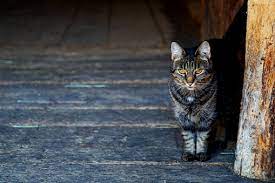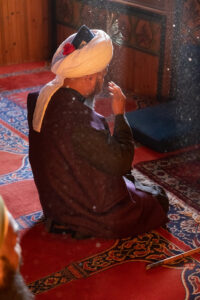Dust, Despair, Cats and Flying Carpets:
BismillahirRahmanirRahim
BismillahirRahmanirRahim

Seyh Lokman Efendi’s HZ sohbets have given me countless words of wisdom, hope, and strength. One of the most powerful reminders he often gives is that “hopelessness and despair are from shaytan”. I often repeat this to myself as someone who struggles with feeling despair and weakness. It can be very hard to remember when you have made a mistake and it feels too big to grapple with and you become lost in a conversation with your shaytan instead of consulting with your Murshid. Acknowledging and admitting our mistakes can be a way to avoid despair. In America we are taught by the conventional tarbiyah methods en vogue today, that we are trying to be perfect Muslims, or at least aiming for that “achievable goal”. Before I learned of tarikat this was a double edged sword for me: I knew that I could never be perfect and yet the arrogant and tough side of me expected perfection from myself and others in ways that were harmful and unrealistic. I knew I was not perfect and made excuses for myself (and others too) while simultaneously holding the delusional thought that I could reach the station of the Holy Prophet AS or the Sahabi ikram (hasha Estagfirullah). This misguided “reminder” is to stop us from “praising the Holy Prophet AS too much, because he was “just a man” while also trying to make us equally accountable to being perfect Muslims, because apparently any “regular man” can do it. (Estagfirullah)
This is, of course, all contrived nonsense which goes away from traditional teachings of Islam. The nature of the Holy Prophet AS as our intercessor inshaAllah is that he, AS, is essentially very different from us. We should aim to mimic the Holy Prophet AS and his Sahabi Ikram but with the understanding that we will never reach their stations: we should instead aim for the perfection of our own stations, as servants, with limitations and flaws. Similarly, our Seyh is acting as the representative of the Holy Prophet AS and we should also firmly know our place and station according to this sunnat and always behave with the proper edep. As murids we must feel blessed to know our station and the work that is given to us, according to the permission of our Seyh. A barn cat will never be a lion, but at least it can do its job well, and keep the mice at bay.

Knowing ourselves and being honest about our limitations, flaws and mistakes is actually part of building a strong faith. One of the many jewels that being in tarikat reveals is the idea that you will fail, you will make mistakes, you will be washed up, and yes it is painful and regrettable, BUT it is entirely necessary for your progress as a murid. Seyh Lokman Efendi Hazretleri often reminds us that we shouldn’t be afraid to act for fear of being washed up; that paralysis and inaction is worse than making a mistake and having to start again, or face scrutiny from our Seyh. Being washed up should not be more frightening to us than being stagnant and stale. As Seyh Efendi so often quotes our beloved master, Mevlana Jelalluddin Rumi Hazretleri: “When someone beats a rug with a stick, he is not beating the rug – his aim is to get rid of the dust. Your inward is full of dust from the veil of ‘I’-ness, and that dust will not leave all at once.” The rug must be cleaned regularly if we are to make progress in cleaning our hearts. This genius analogy becomes even more rich when you realize that a rug only has to do its job to accumulate dust: in living its humble life, dust settles upon it, just like humans who may be fooled into thinking they don’t have egos because they had simple lives. Still, the flat lying rug, collects dust, simply living and serving its purpose; so does man collect mistakes and flaws in going through his life, regardless of his own judgment of his actions, or inaction. Fortunately, however dusty we are when we start on this way, or however dusty we become rolling in the barnyard of our nefs and egos, know that it is a part of the journey and do not despair. The rug’s owner can remove the dust and find the weak strands of the rug, strengthening the worn seams and stitches. Just like an efficient barn cat, playing his role, the humble rug fulfills its purpose in submission to its owner and the threads show its true colors. In the right owner’s hands, a filthy rug may become a flying carpet: cleaned of dust and stains and with the knowledge that falling is simply training for flying.
